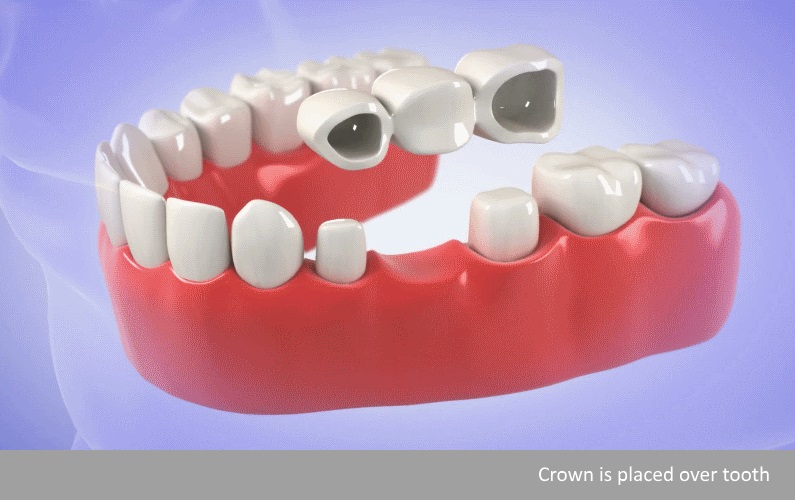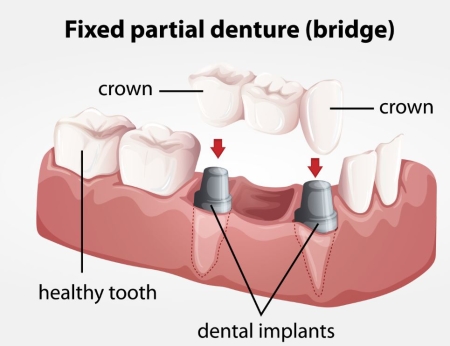On this page:
What are Dental Bridges?
How are Dental Bridges Prepared?
Benefits of Fixed Bridges
Caring for Your Teeth Bridges
At Tustin Smile, we take pride in offering beautiful dental bridges to our patients, to replace any and all of their missing teeth. That way, their new smile can look and feel just like their former natural one. While fixed bridges are considered a durable and reliable option for replacing natural teeth, they need to be looked after carefully if you want them to function properly and last for a long time. Whether you need bridges to support front teeth, bottom teeth, or your back teeth, then visiting your nearest dentistry location is a must. This choice won’t lead to any pain, and requires little recovery time. Before we discuss how to care for your new bridges, we have to learn what they are, what types of work they require, and how they function.
What are Dental Bridges?
Dental bridges are fixed dental appliances that are used for the permanent replacement of missing natural teeth by gaining support from the adjacent healthy teeth on either side of the gap. The ones that support the bridge are known as abutment, while the ones that fill the gaps are known as the pontics. Unlike the conventional removable dentures, these remain fixed and can only be removed by a dentist, if and when required. Dental bridges are made with a variety of material, in some cases being composed of metal and in others without metal.

How are Dental Bridges Prepared?
Tustin Smile is the closest home for expert dentistry if you’re in the Orange County area. Our primary focus is to provide you with high quality and aesthetically pleasing dental bridges. Preparation at our Southern California office is carried out in the following steps:
-
- Clinical Evaluation – Before starting the procedure, our dentist, Dr. Amit Shah (D.D.S) will first perform a detailed examination of your mouth. Dr. Shah will also look at your X-Rays to evaluate the condition of the abutment teeth and to assess the quality of the underlying jaw bone. This is done to prepare a comprehensive treatment plan for restoring your missing teeth. At the same time, your eligibility for getting dental bridges is also decided during the clinical examination after the thorough examination of your molars. .
- Teeth Preparation – The abutment teeth are on either side of your jaw, that support the bridge. They are prepared by slightly removing the tooth structure. They are shaped in such a way that the inner surface of the bridge fits perfectly on them.
- Impression Making – Next, Dr. Shah will make an impression of your newly prepared replacements, and send it to the dental laboratory. Back at the lab, our technicians will use this impression to prepare a metallic or porcelain framework of the bridge. It is also possible to provide a layer of porcelain over the metal framework to improve the aesthetics of all your teeth, even the molars in the back.
- Attaching the Bridge to the Teeth – Once the prepared bridges are returned from the laboratory, Dr. Shah will try them on you before cementing them. Once the bridge has been fitted, Dr. Shah and you both are satisfied with the aesthetics and fit of the bridge, it will be permanently attached, with the help of an adhesive cement. Then, you just have wait for the recovery time to finish on your brand new and improved smile.

Benefits of Fixed Bridges
If you’re thinking why you should get dental bridges over the conventional removable dentures at Tustin Smile, then here are some of the benefits of the procedure.
- Superior Aesthetics – Removable dentures can get stained easily and lose their aesthetics very quickly. On the other hand, we provide highly aesthetic bridges at which will restore your facial aesthetics and give you a reason to smile!
- Durability – The framework of your new teeth bridges is prepared using very strong dental alloys. As a result, they can remain functional even after ten years. In contrast, removable dentures usually cannot last for more than 2 years.
- Convenience – One of the major drawbacks of removable dentures is that they do not completely restore chewing and speech capability. On the other hand, bridges will remain fixed to your teeth, and more easily allow you to speak and eat just like when you had your original ones.
- Minimal Need for Repair – Removable dentures need to be repaired or replaced quite frequently. The dental bridges, on the other hand, are fabricated from very strong and durable dental alloys which. Therefore, they do not need to be repaired or replaced as frequently as the removable dentures.
- Eat Everything You Like – Removable dentures do not provide sufficient chewing capability to enable you to eat foods that require increased masticatory forces, such as meat, chicken etc. Teeth bridges are directly fixed to your teeth. This means that, by using your teeth bridges you can enjoy all your favorite foods that you could never eat with removable dentures.
Caring for Your Teeth Bridges
Since bridges are fixed to your teeth, there are chances that food particles may get embedded beneath them. Therefore, special care is required to ensure their longevity and clinical success. We advise our patients to care for their bridges in the following ways:
- Strict Oral Hygiene Care – Failure to maintain optimal oral hygiene around the bridge may result in the development of periodontal problems. As a result, the abutment teeth supporting the bridge may start to hurt and become loose due to bone resorption or bone loss. This ultimately could result in clinical failure of the prosthesis. Regular measures must include the following:
- Brushing Your Teeth – Make sure that you brush your teeth at least twice a day. This will ensure that food and bacterial debris beneath the bridges is completely removed at the end of the night. In some cases, brushing beneath the bridge can become difficult as there is insufficient space available for the brush to penetrate and clean the area completely. In these cases, we recommend that you use an inter-dental toothbrush, which is specifically designed for cleaning.
- Flossing – Flossing at least once a day will also help maintain optimal oral hygiene around the fixed denture. Our expert dental hygienists will guide you through the process, ensuring that you learn the correct method of flossing between your teeth.
- Mouthwash – Using recommended amounts of mouthwash every day is another highly effective method for maintaining optimal oral hygiene. You can use any mouthwash available on the market. On the other hand, your dentist may advise a medicated mouthwash if you are at a higher risk of developing gum problems.

